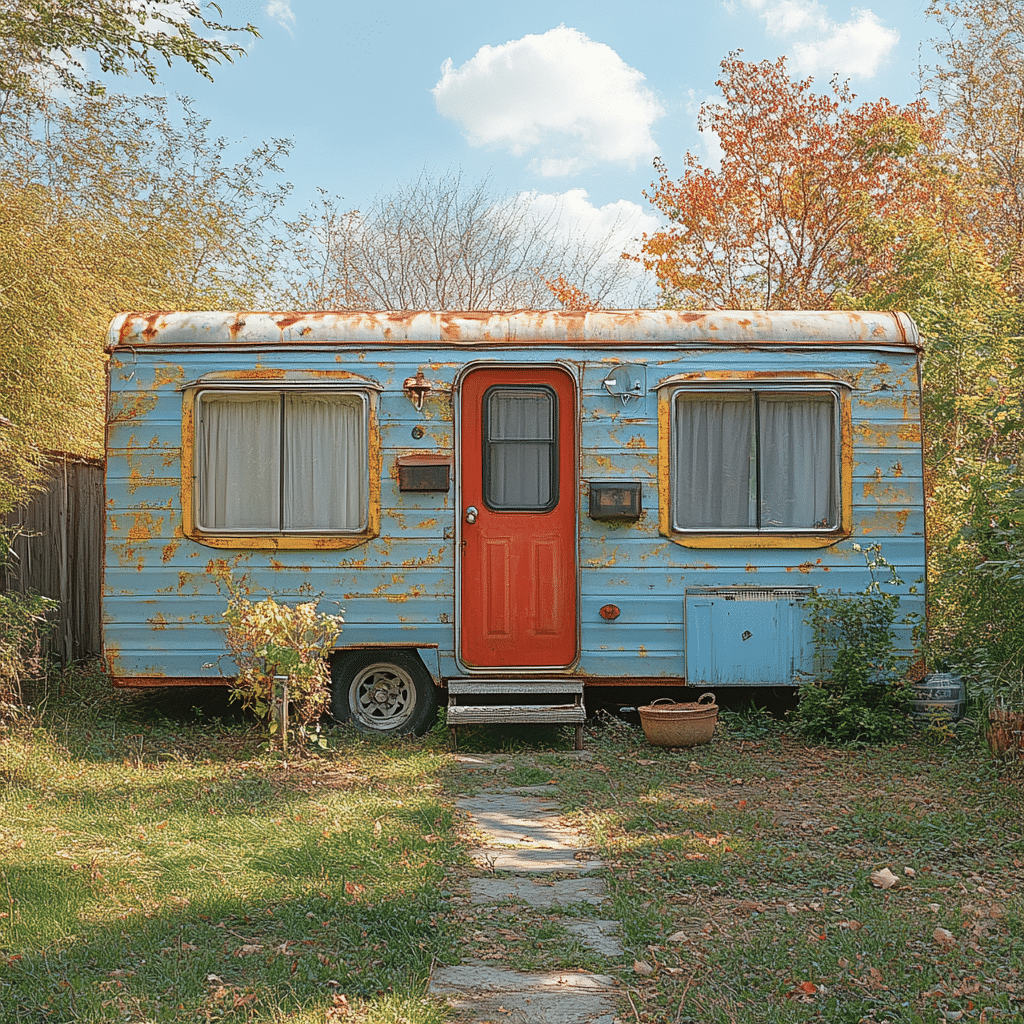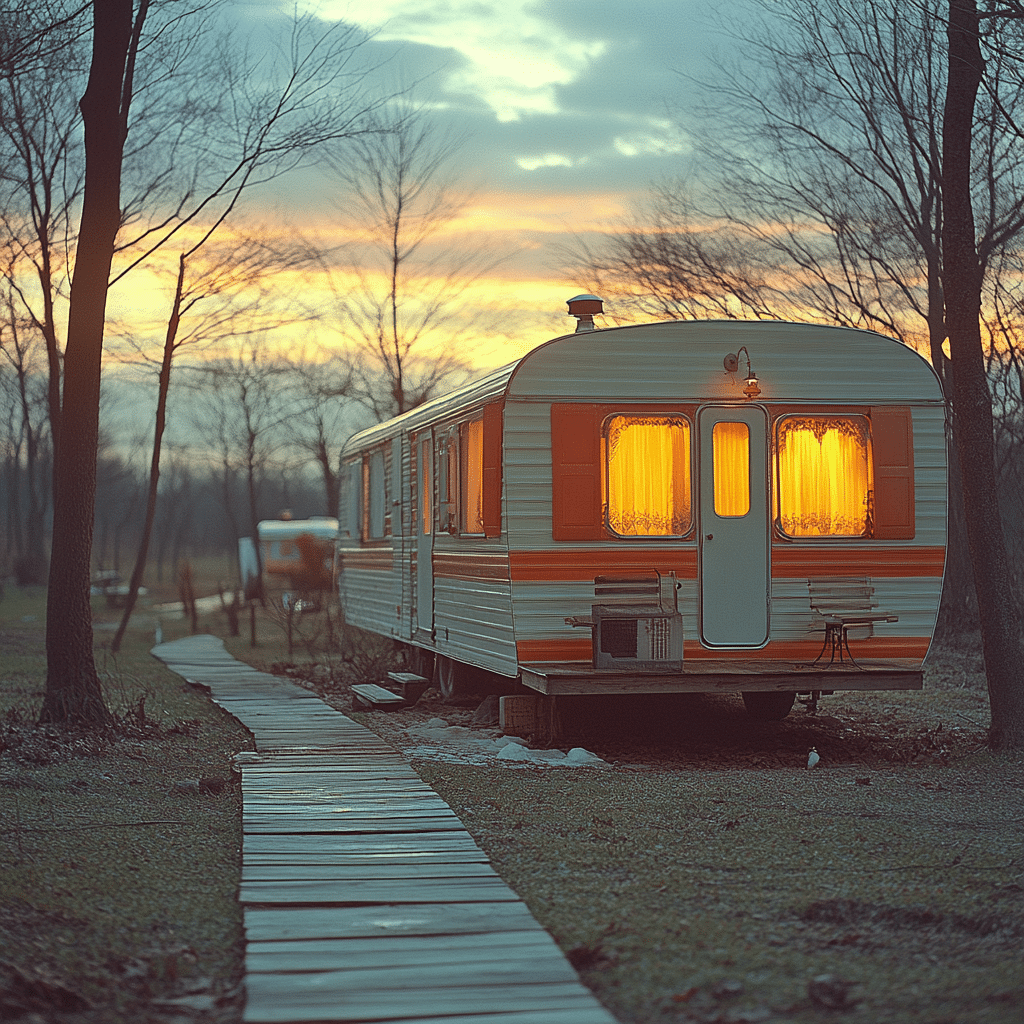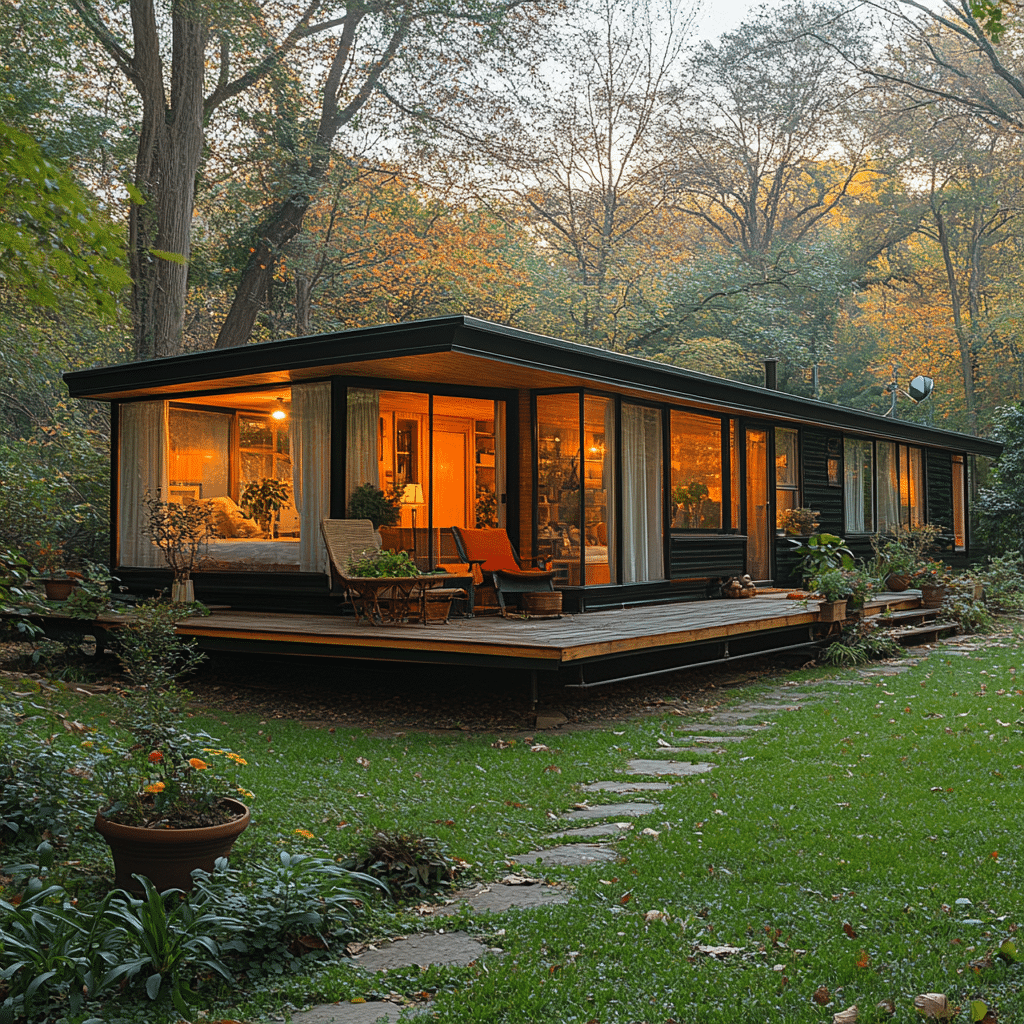Purchasing a mobile home can be a strategic and economical alternative to buying a traditional house. This guide dives into every facet of a mobile home purchase to help you make informed decisions and writes the roadmap to your dream home.

Benefits and Considerations of Buying a Mobile Home
Affordability
Mobile homes are generally more affordable than traditional houses. According to the U.S. Census Bureau, the average cost of a new single-wide mobile home was around $55,600 in 2023. This is significantly less than the cost of a site-built home. It offers a budget-friendly option for those looking to own a home without breaking the bank.
Flexibility
One of the notable advantages of mobile homes is the flexibility they provide. If you own land, you can move your mobile home later if needed. This relocation option is something that traditional houses simply can’t offer. Moreover, it opens up possibilities for those who may need to move frequently due to job changes or personal preferences.
Maintenance and Depreciation
While mobile homes are a cost-effective solution, it’s important to consider the downsides. Unlike traditional homes which often appreciate, mobile homes may depreciate over time. Maintenance can also be more frequent and costly. Always factor in these additional expenses when budgeting for your mobile home purchase.

Steps to Buying a Mobile Home
Evaluate Your Needs and Preferences
Determine what type of mobile home meets your needs. Choose between single-wide, double-wide, or multi-section units. Each has its unique features and space considerations. If you’re leaning towards a new mobile home, explore customization options to tailor it to your preferences.
Budgeting and Financing
Establish a clear budget. Don’t forget to include the cost of land if you plan to buy it. Financing options are plentiful, with institutions like Quicken Loans offering specialized manufactured home loans. FHA (Federal Housing Administration) and VA (Veterans Affairs) loans may also be viable options, especially if the mobile home is attached to a permanent foundation. For more detailed resources on financing, check out our guide on fixed mortgage rates.
Research and Select Mobile Home Models
Compare various brands and models such as Clayton Homes, Fleetwood Homes, and Champion Homes. Assess the build quality, customer reviews, and warranty details. This ensures you get the best value and a reliable product that meets your needs.
Choosing a Location
Consider whether you’ll place your mobile home on privately owned land or in a mobile home park. Each option has different financial and lifestyle implications. Mobile home parks can provide community benefits but come with monthly fees, while owning your land gives you more freedom but higher initial costs.
| Category | Details |
| Types of Mobile Homes | – Single-Wide: One section, typically 600-1,300 sq ft, easier to move and more affordable. |
| – Double-Wide: Two sections, typically 1,000-2,300 sq ft, offers more space and amenities. | |
| – Triple-Wide and Larger: Three or more sections, usually 2,500+ sq ft, offers a high-end, spacious living experience. | |
| Average Price Range | – Single-Wide: $50,000 – $85,000 |
| – Double-Wide: $70,000 – $150,000 | |
| – Triple-Wide and Larger: $100,000 – $250,000+ | |
| Financing Options | – Chattel Loan: Financing specifically for movable property, usually comes with higher interest rates. |
| – FHA Title I Loan: Government-backed loan with lower interest rates, requires the home to be situated on an approved lot. | |
| – Personal Loan: Can be used if the other options don’t fit, but may have high interest rates and shorter terms. | |
| – VA Loans: Available for eligible veterans, often with favorable terms. | |
| Key Benefits | – Affordability: Generally more affordable than traditional homes. |
| – Flexibility: Can be moved if necessary, although moving can be costly. | |
| – Quick Installation: Can often be set up more quickly than building a traditional home. | |
| – Lower Property Taxes: Often have lower tax rates compared to site-built homes. | |
| Potential Drawbacks | – Depreciation: Mobile homes may depreciate in value over time, unlike traditional homes that can appreciate. |
| – Financing Challenges: Higher interest rates and shorter loan terms compared to mortgages for traditional homes. | |
| – Zoning Restrictions: Must adhere to local zoning laws and land use regulations, which can be limiting. | |
| Buying Tips | – Research Local Laws: Understand zoning laws, land lease terms, and taxation policies in your desired area. |
| – Inspect Before Buying: Always have the home inspected by a professional for any potential issues. | |
| – Consider Resale Value: Check the historical resale values of mobile homes in the area to make a better financial decision. | |
| – Utilities and Amenities: Verify the availability and cost of utilities, and consider the amenities offered by mobile home parks. | |
| Insurance | – Types: Similar to homeowners insurance, covers the structure, belongings, and provides liability protection. |
| – Cost: Varies based on location, home value, and coverage options, typically between $250 – $1,300 annually. |
Financing Your Mobile Home: Options and Strategies
FHA Loans
FHA loans are an excellent option for those meeting specific criteria. These loans offer benefits like lower down payments and competitive interest rates, making homeownership more accessible.
Personal Loans
Institutions like Quicken Loans provide personal loans up to $100,000. These can be a great way to secure additional funding if needed. However, always be mindful of interest rates and repayment terms.
Chattel Loans
For homes not affixed to land, chattel loans are specifically designed for movable property. These loans often come with higher interest rates but can be an effective solution for buying a mobile home without land.
‘Lend a Dollar’ Initiatives
Community-based lending programs, often referred to as ‘Lend a Dollar,’ can be invaluable for buyers with limited credit history or financial resources. These programs aim to assist low-income families and first-time homebuyers embark on their homeownership journey.
Insuring Your Mobile Home: Protecting Your Investment
Types of Coverage
Standard mobile home insurance policies cover damage from fire, wind, and theft. Additional coverage options may include liability and flood insurance. Comprehensive coverage ensures your investment is protected from various risks.
Selecting an Insurer
Research and compare policies from reputable insurers like Allstate, Geico, and State Farm. Ensure you understand the coverage details and premiums before committing.
Cost Factors
Insurance premiums depend on several factors including the age, location, and value of your mobile home. Your credit score and claims history also play a role. It’s essential to get quotes from multiple providers to find the best deal.
Acquiring Land for Your Mobile Home
Land Ownership vs. Mobile Home Parks
Weigh the long-term benefits and restrictions of land ownership against the cost-effectiveness and community benefits of mobile home parks. While owning the land can be more expensive upfront, it offers greater freedom and potential investment gains.
Zoning Laws and Regulations
Investigate local zoning laws, building codes, and community covenants that affect where you can place a mobile home. Compliance with these regulations is crucial to avoid legal issues.
Costs and Amenities
Compare the total costs involved in both scenarios, including property taxes, utilities, and community fees. Make sure you understand all financial aspects before making your decision.
Writing Letters for Money: Grant and Assistance Programs
HUD Programs
The U.S. Department of Housing and Urban Development (HUD) offers several assistance programs aimed at low-income families. These can provide grants and loans to make mobile home purchases more affordable.
Non-Profit Organizations
Organizations like Habitat for Humanity offer grants and building assistance to those in need. Exploring these options can be beneficial if you’re looking to reduce costs.
Local Government Grants
Investigate local and state government grants and subsidy programs designed to help first-time homebuyers. These programs can often provide the financial boost needed to finalize your mobile home purchase.
Finalizing Your Mobile Home Purchase
Conduct Inspections and Approvals
Hire a professional inspector to check the mobile home for compliance with HUD standards. This verifies that your home meets safety and quality requirements. Additionally, obtain the necessary permits and approvals from local authorities.
Negotiate and Review the Purchase Agreement
Review the purchase agreement carefully. Ensure all terms and conditions are clear and fair. Don’t hesitate to negotiate any aspects that don’t meet your expectations or financial situation.
Setup and Delivery
Coordinate with the mobile home dealer for delivery and installation. Ensure the home is securely installed and all utility connections are appropriately made. This step is crucial to start enjoying your new home without issues.
The Road Ahead: Living and Thriving in Your New Mobile Home
Owning a mobile home opens the door to a new lifestyle with unique benefits and challenges. Continuous maintenance, community involvement, and being aware of market trends ensure you enjoy your mobile home to the fullest. Transitioning to mobile home living doesn’t merely save money; it offers a chance to be part of a growing, supportive community.
With strategic planning and informed decisions, your dream of owning a mobile home can be both satisfying and financially sound. The growing trend of mobile home investments in 2024 shows a promising outlook for those ready to embrace this versatile housing option.
For more details on securing your mobile home dream, explore our resources on home mortgage rates today and home Loans best.
Now it’s your turn! Dive into this comprehensive guide and start your journey towards owning a mobile home today.
Mobile Home Purchase: Fun Trivia and Interesting Facts
The Unfolding Tale of Mobile Homes
Mobile home purchase has boomed since the 1970s, serving as an affordable alternative for many. But did you know that early mobile homes were often marketed as “travel trailers”? These homes were designed to be towed by vehicles, morphing over time into the more residential mobile homes we recognize today.
A Star’s Touch
Here’s a tidbit for movie buffs: Kevin Costner, known for his rugged roles, prefers the simplicity of mobile homes. Interestingly, the actor’s name often gets mashed up with Daniel Craig, the James Bond star, creating a puzzle for fans. Their lifestyles are quite different, but who could’ve guessed James Bond would share a quirky connection with mobile homes? Daniel Craig and Kevin Costner( embody unique Hollywood mysteries and facts.
Financing Fascinators and Safety Standards
It gets more intriguing. While securing a loan for a regular home can be a labyrinth, getting a loan From an officer for a mobile home can sometimes be a smoother process. Plus, mobile homes today must meet HUD standards. These regulations ensure homes are safe and well-constructed—far from the chaotic images one might associate with illegal substances( like crystal meth.
Global Perspectives
You might be surprised to learn that the concept of mobile homes isn’t restricted to the United States. In fact, China ‘s innovative Sails in the housing industry have led to some fascinating adaptations, merging ancient traditions with modern mobile living solutions. It’s a global phenomenon!
Payments and Perks
Finally, let’s talk dollars and cents. A significant perk of a mobile home purchase is the flexibility in payments. Unlike traditional home mortgages, payment structures can be far less rigid and more tailored to individual circumstances. On your journey to making house Payments, this flexibility can provide peace of mind, enhancing the appeal of mobile home living.
This fusion of interesting facts and practical tips enriches the knowledge pool for anyone considering a mobile home purchase. Dive into the fascinating world of mobile homes, and you’re sure to uncover even more compelling stories and essential insights.




